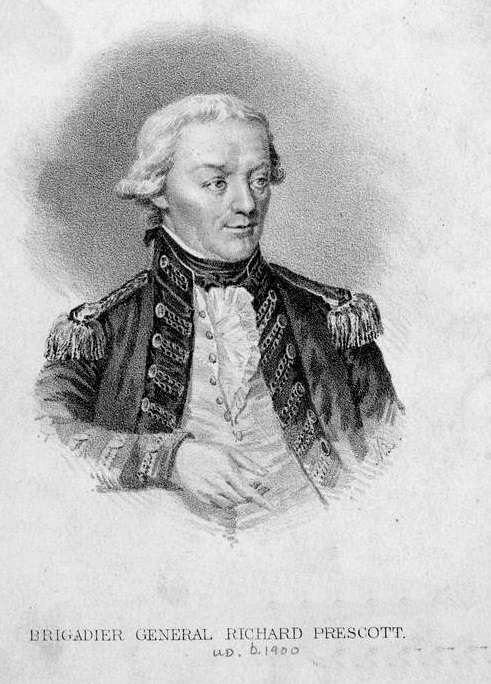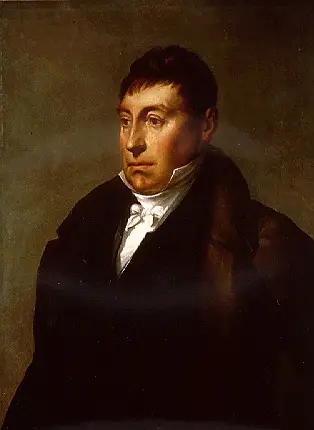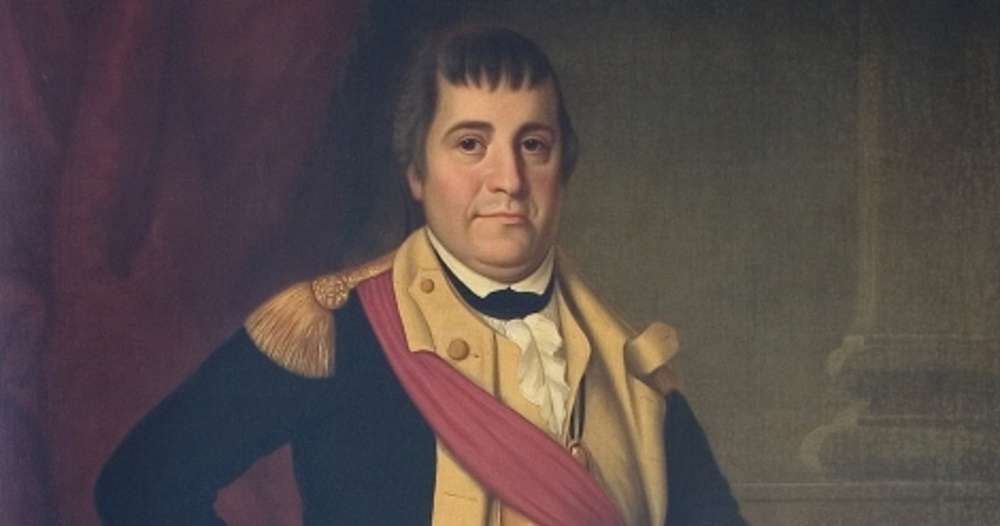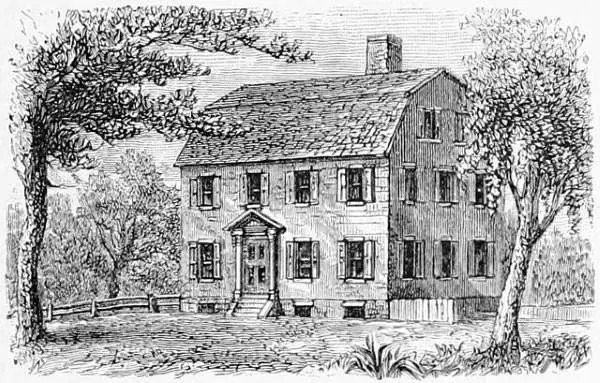Rhode Island’s Col. William Barton seized his place in history in July of 1777 when he slipped into Middletown, R.I. He passed more than 1,000 occupying British troops and kidnapped British General Richard Prescott from the house he occupied.

Portrait of William Barton by James Louis Sullivan now at Brown University in the Rhode Island Historical Society collection.
The news undoubtedly made an impression on the young Marquis de Lafayette, who had just arrived on his first visit to America hoping to join the Revolution. Years later, Lafayette would try to help Barton out.
Barton’s fortunes would take a bitter turn following his daring escapade. He spent more than a decade in a Vermont prison for nonpayment of a small debt to a town named after him.
William Barton
William Barton was born on May 26, 1748, in Warren, R.I. He took up the trade of hatter, which may explain his later mad behavior.
He married Rhoda Carver in 1771, and they eventually had four children. When he learned about the Battle of Bunker Hill, he joined a Rhode Island regiment as an adjutant in August 1775.
By 1777, the British occupied Newport, R.I. Sir Henry Clinton had commanded the occupation, but returned to England and left the high-handed Gen. Richard Prescott in charge.

Maj. General Richard Prescott was a thorn in the side of Rhode Islanders during the British occupation of Newport.
Prescott had already earned a bad reputation for his harsh treatment of American prisoners, including Ethan Allen. In Newport he allowed his men to cut down nearly every tree and use wooden grave markers for firewood. He ordered crops destroyed and people thrown in jail. And when people failed to doff their hats at him, he struck them with his cane, shouting, “Disperse, ye rebels.”
His men hated him as much as the Rhode Islanders did, which would prove his undoing.
In June 1777, William Barton, now a lieutenant colonel, had his headquarters in Tiverton, R.I. An American named Coffin escaped British captivity and made his way to the American lines. He told Barton that Prescott was living on an isolated farm belonging to Henry Overing, and he had forced his attentions on Mrs. Overing. Only a sentry and a few soldiers guarded the house.
The Kidnapping
Coffin convinced William Barton he could capture Prescott. So Barton took five whaleboats and 40 men who knew how to use them, muffled the oars with lambs’ wool and set out for Portsmouth. It took them 26 hours to travel 10 miles in pouring rain. The men had no idea what they were about to do.

Replica of a traditional whaleboat at Mystic Seaport.
They halted at Hog Island near the mouth of the harbor. The rain stopped, and at midnight Barton revealed the plan. After a day of rest, they slipped past the British warships guarding the harbor at night. The men put ashore opposite the Overing property and hiked through rough terrain to the house.
A sentry challenged them, but they quickly overpowered him. The sentry told them Prescott was asleep on the second floor. They found Prescott, though whether Mrs. Overing was with him is lost to history. “You are my prisoner,” said Barton.
“I acknowledge it, sir,” replied Prescott.
Barton ordered him out of bed and hustled him in his nightclothes toward the whaleboats. Thus Prescott earned the nickname ‘The Barefoot General.’
Not long after he landed, a boat arrived under a flag of truce carrying the general’s clothing, wigs and perfumes. Eventually the Americans exchanged him for captured Continental Army general Charles Lee.
Vermont
William Barton received a painful leg injury in fighting in 1778 and never fully recovered. He did, however, continue to serve in the Continental Army throughout the Revolution.
But Barton’s orneriness, an asset during his war service, soon became a detriment. To honor his military achievements, the Congress awarded him a French-made decorative gold sword.
He bought land in northern Vermont in a town that now bears his name – Barton. He soon got embroiled in a bitter lawsuit over land that he had sold to two people. The court ordered him to pay $320 in damages.
Stubborn and difficult, William Barton refused to pay – though he could have. For 14 years he stayed in the prison in Danville, Vt., rather than settle his debt.
He had to live in a yard surrounded by chains, where people came to visit him and hear how he captured Prescott. Barton happily obliged.
Lafayette
The Marquis de Lafayette seldom forgot a friend, as he showed when he visited Vermont in 1825 on his final celebratory tour of America.
He had gone to Barton’s home in Providence, where Rhoda Barton told him he hadn’t visited her in 30 years.

Lafayette in 1825
The French hero of the American Revolution then saw Barton during his travels through Vermont. He offered to pay Barton’s debt, but Barton refused. Lafayette then quietly paid it himself.
After emerging from jail at age 77, William Barton found his capture of the British general had became a cause for celebration, commemorated annually. He would die six years later, his reputation restored, and be buried back in Rhode Island.
This story about William Barton was updated in 2022.
Images: Whaleboat By Stan Shebs, CC BY-SA 3.0, https://commons.wikimedia.org/w/index.php?curid=115479.


3 comments
Always enjoy your articles! You might want to correct 1878 to 1778, the date when his leg was injured
Many thanks!
[…] the night of July 11, 1777, Col. William Barton and about three dozen infantrymen sailed from Tiverton to Middletown and captured British general […]
Comments are closed.